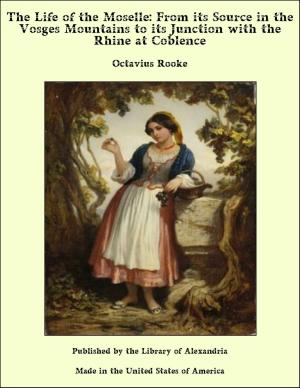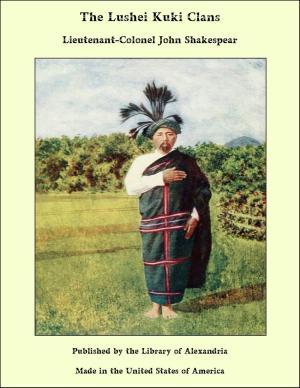Locke Amsden: The Schoolmaster
Nonfiction, Religion & Spirituality, New Age, History, Fiction & Literature| Author: | Daniel Pierce Thompson | ISBN: | 9781465618177 |
| Publisher: | Library of Alexandria | Publication: | March 8, 2015 |
| Imprint: | Language: | English |
| Author: | Daniel Pierce Thompson |
| ISBN: | 9781465618177 |
| Publisher: | Library of Alexandria |
| Publication: | March 8, 2015 |
| Imprint: | |
| Language: | English |
Our story, contrary perhaps to fashionable precedent, opens at a common farm-house, situated on one of the principal roads leading through the interior of the northerly portion of the Union. It was near the middle of the day, in that part of the spring season when the rough and chill features of winter are becoming so equally blended with the soft and mild ones of summer upon the face of nature, that we feel at loss in deciding whether the characteristics of the one or the other most prevail. The hills were mostly bare, but their appearance was not that of summer; and the tempted eye turned away unsatisfied from the cheerless prospect which their dreary and frost-blackened sides presented. The levels, on the other hand, were still covered with snow; and yet their aspect was not that of winter. Clumps of willows, scattered along the hedges, or around the waste-places of the meadows, were white with the starting buds or blossoms of spring. The old white mantle of the frost-king was also becoming sadly dingy and tattered. Each stump and stone was enclosed by a widening circle of bare ground; while the tops of the furrows, peering through the dissolving snows, were beginning to streak, with long, faint, dotted lines, the self-disclosing plough-fields. The cattle were lazily ruminating in the barn-yard, occasionally lowing and casting a wistful glance at the bare hills around, but without offering to move towards them, as if they thought that the prospects there were hardly sufficient to induce them yet to leave their winter quarters. The earth-loving sheep, however, had broken from their fold, and, having reached the borders of the hills by some partially trod path, were busily nibbling at the roots of the shriveled herbage, unheedful of the bleating cries of their feebler companions, that they had left stuck in the treacherous snow-drifts, encountered in their migrations from one bare patch to another. The owner of the farming establishment, in reference to which we have been speaking, was in the door-yard, engaged in splitting and piling up his yearly stock of fire-wood. He was a man of about forty, not of a very intellectual countenance, indeed, but of a stout, hardy, and well-made frame, which showed to advantage in the handsome and appropriate long, striped, woollen frock, in which he was plying himself with the moderate and easy motions which are, perhaps, peculiar to men of great physical power. A rugged and resolute-looking boy, of perhaps a dozen years of age, having thrown himself upon one knee before a small pile of prepared wood, lying near the kitchen door for immediate use, and having heaped the clefts into one arm till they reached to his chin, as if in whim to see how much he could carry in, was now engaged in trying, with a capricious, bravado-like air, to balance an additional stick on his head, by way of increasing his already enormous load.
Our story, contrary perhaps to fashionable precedent, opens at a common farm-house, situated on one of the principal roads leading through the interior of the northerly portion of the Union. It was near the middle of the day, in that part of the spring season when the rough and chill features of winter are becoming so equally blended with the soft and mild ones of summer upon the face of nature, that we feel at loss in deciding whether the characteristics of the one or the other most prevail. The hills were mostly bare, but their appearance was not that of summer; and the tempted eye turned away unsatisfied from the cheerless prospect which their dreary and frost-blackened sides presented. The levels, on the other hand, were still covered with snow; and yet their aspect was not that of winter. Clumps of willows, scattered along the hedges, or around the waste-places of the meadows, were white with the starting buds or blossoms of spring. The old white mantle of the frost-king was also becoming sadly dingy and tattered. Each stump and stone was enclosed by a widening circle of bare ground; while the tops of the furrows, peering through the dissolving snows, were beginning to streak, with long, faint, dotted lines, the self-disclosing plough-fields. The cattle were lazily ruminating in the barn-yard, occasionally lowing and casting a wistful glance at the bare hills around, but without offering to move towards them, as if they thought that the prospects there were hardly sufficient to induce them yet to leave their winter quarters. The earth-loving sheep, however, had broken from their fold, and, having reached the borders of the hills by some partially trod path, were busily nibbling at the roots of the shriveled herbage, unheedful of the bleating cries of their feebler companions, that they had left stuck in the treacherous snow-drifts, encountered in their migrations from one bare patch to another. The owner of the farming establishment, in reference to which we have been speaking, was in the door-yard, engaged in splitting and piling up his yearly stock of fire-wood. He was a man of about forty, not of a very intellectual countenance, indeed, but of a stout, hardy, and well-made frame, which showed to advantage in the handsome and appropriate long, striped, woollen frock, in which he was plying himself with the moderate and easy motions which are, perhaps, peculiar to men of great physical power. A rugged and resolute-looking boy, of perhaps a dozen years of age, having thrown himself upon one knee before a small pile of prepared wood, lying near the kitchen door for immediate use, and having heaped the clefts into one arm till they reached to his chin, as if in whim to see how much he could carry in, was now engaged in trying, with a capricious, bravado-like air, to balance an additional stick on his head, by way of increasing his already enormous load.















